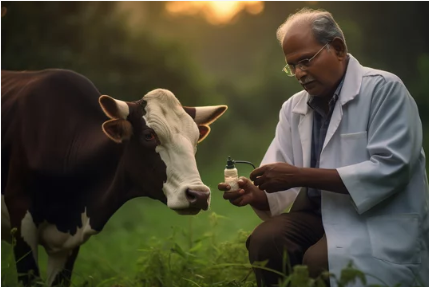
BLOG
Animal diseases are a global challenge

About a month ago, the United States Department of Agriculture (USDA), the Food and Drug Administration, Centers for Disease Control and Prevention, and State veterinary and public health officials released a report stating that they are studying an illness among dairy cows in various States.
This report came after the Highly Pathogenic Avian Influenza (bird flu), which commonly affects poultry farms, was discovered in dairy cows and the subsequent infection of a dairy farm employee.
The virus has spread to more States over the past month. Recent reports suggest the virus has spread to 36 cattle herds across nine states (from six states at the beginning of April).
There remain concerns in the US about the subsequent
transmission to humans and other livestock products. The scientists are
currently studying this outbreak and have called for calm amongst the
consumers. The US Centers for Disease Control and Prevention views it as "a low risk to the general public at this time."
There are also ongoing discussions about ways of containing its spread and tests of
possible vaccines in the US.
Encouragingly, outside the US, we don't know of any
cases where bird flu has transitioned into livestock and people. I have recently
communicated with South Africa's Department of Agriculture, Land Reform and
Rural Development leadership to understand if this matter is under monitoring
and the country remains safe. Indeed, South Africa remains secure and vigilant.
This issue is primarily in a couple of states in the US.
Animal diseases are a major global challenge, and we
will likely continue to see animal disease outbreak reports in the coming
years. Europe, Asia, Africa and the Americas are some regions that typically
report disease outbreaks such as avian flu, foot and mouth disease, and African
swine fever.
Therefore, South Africa must strengthen surveillance
to ensure an agile response from regulators when there are outbreaks. As part
of the long-term planning, South Africa's Department of Agriculture, Land
Reform and Rural Development should also increase its spending on animal
health-related matters and build local capacity. This is essential to support
the subsector, making up nearly half South Africa's agricultural economy.
Because South Africa has recently suffered the spread
of animal disease, farming businesses and government officials arguably remain
on high alert, which helps with surveillance in times of such high risk of
animal diseases globally.
The frequent occurrences of animal diseases also imply
that some countries, like South Africa in 2021 and 2022, may occasionally lose
access to export markets while they work to clear the disease.
During such times, the disease-free countries would
potentially increase their volume of exports to markets. South African red meat
and livestock product exporters should always be alert to opportunistic export
gaps. This is not a unique practice in South Africa; competitors typically
increase their market presence when other suppliers are constrained.
In essence, animal diseases are increasingly a
significant challenge globally. South Africa has undergone various cycles of
foot and mouth disease in the cattle industry, multiple strains of avian
influenza in poultry, and the African swine fever in the pig industry. All
these episodes were costly to farming businesses and distracted South Africa
from its export ambition. Notably, there is always a risk of another outbreak
as some of these diseases have become pervasive.
The news
of the US bird flu transmission to dairy and humans reminds us of animal
disease risks and uncertainty. Fortunately, South Africa remains safe. Still,
the farmers, feedlots, and regulators should remain vigilant.
Wandile Sihlobo is the chief economist
at the Agricultural Business Chamber of SA and a senior fellow in
Stellenbosch University's Department of Agricultural Economics. His latest book
is "A Country of Two Agricultures".

0 COMMENTS
LEAVE A COMMENT